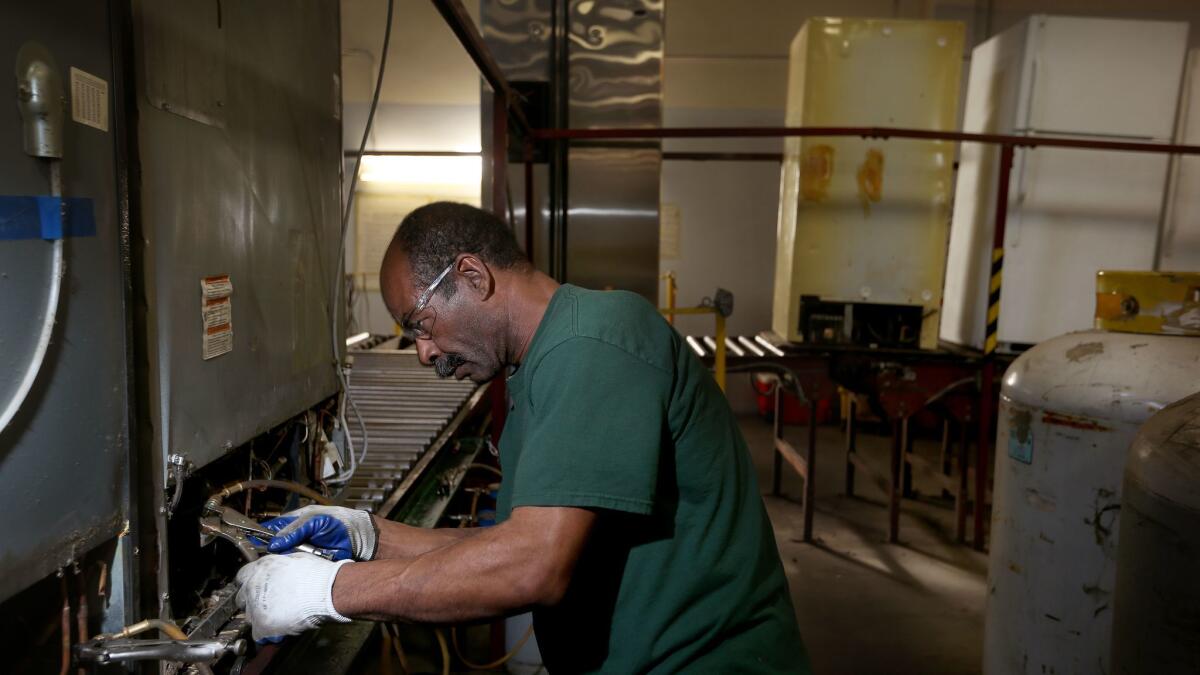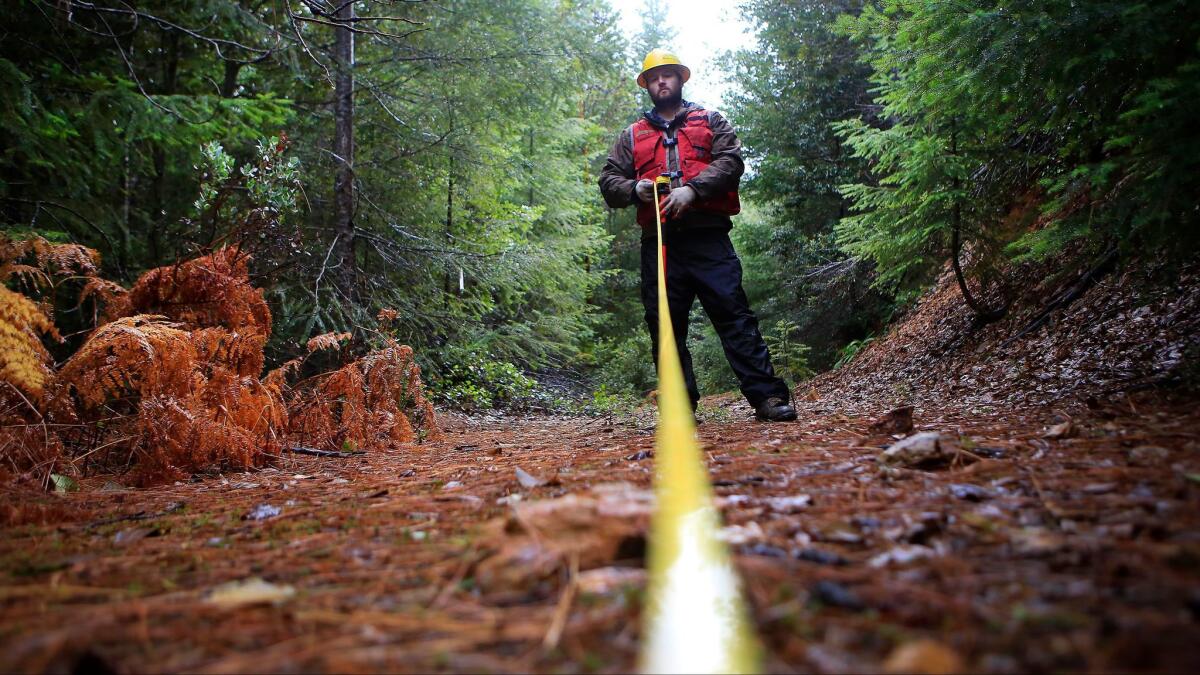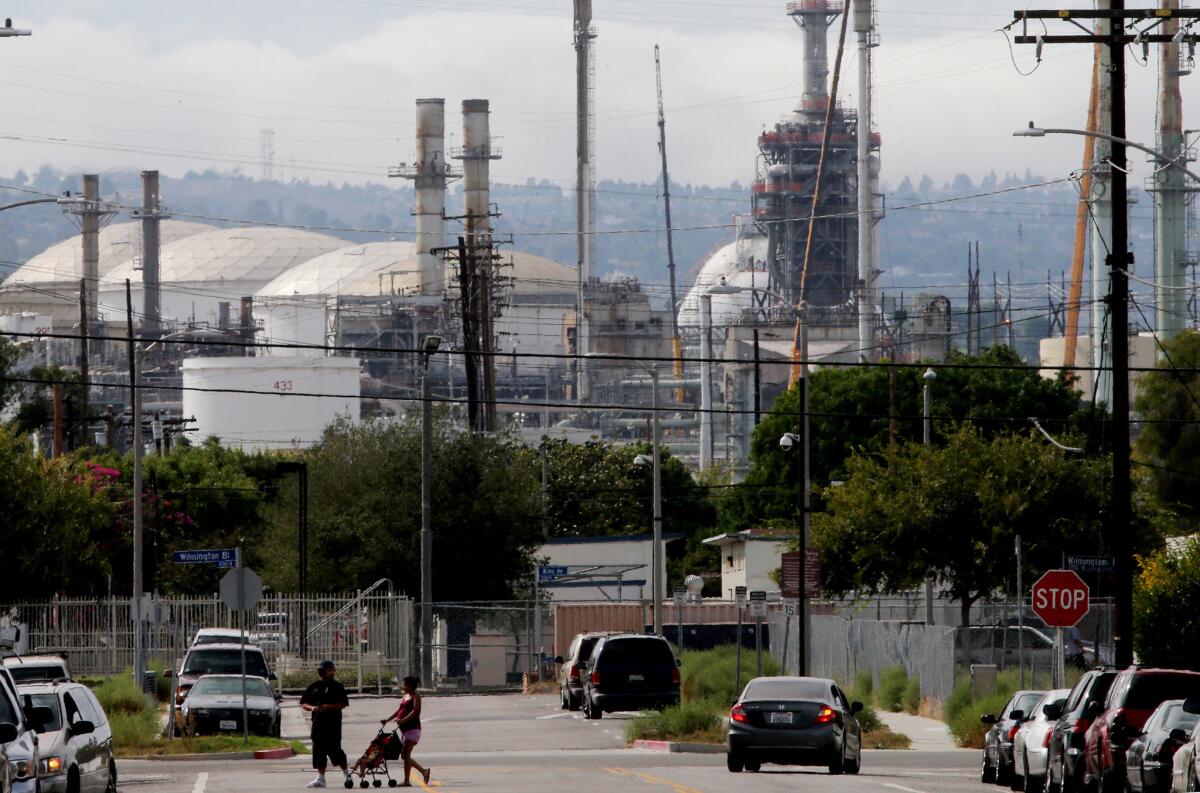In the battle over California climate policies, green projects are now in the hot seat

Outdated refrigerators arrive at a Compton warehouse in a funeral procession of defunct appliances. Workers vacuum out the coolants and ship the chemicals halfway across the country, where they’re destroyed instead of allowed to escape into the atmosphere, worsening global warming.
The operation is among dozens of projects that qualify as carbon offsets, which are funded by major polluters such as oil refineries and power plants to comply with California’s requirements for slashing greenhouse gases.
By paying for offsets, companies can generate environmental benefits anywhere in the country — they are not required to invest in green projects in California — as an alternative to cleaning up their own operations. Now that lawmakers are debating how to continue the state’s fight against climate change, the system is being targeted by some environmentalists who would rather force industry to directly reduce its emissions.
“Offsets are loopholes for our largest corporate polluters,” said Amy Vanderwarker, co-director of the California Environmental Justice Alliance.
The criticism reflects an old divide over whether the state’s climate policies should focus on the global problem of greenhouse gases, where reductions anywhere in the world can improve the atmosphere, or on local concerns about public health. That debate has renewed importance this year, providing a test of political strength in Sacramento for environmental justice groups that are increasingly turning their attention from neighborhood battles to statewide policy negotiations.
“That community has come of age as an advocacy body,” said state Sen. Henry Stern (D-Los Angeles), who worked on environmental legislation before his election in November. “I think it’s going to rearrange the politics of California for decades to come.”
Assemblywoman Autumn Burke (D-Inglewood) has proposed encouraging the development of more offsets within California, particularly in disadvantaged communities. Other lawmakers working on climate proposals have incorporated environmental justice ideas to help low-income people of color harmed by pollution.
“The fact that we’re even talking about it is a sign of growth and power,” said Parin Shah, a senior strategist at the Asian Pacific Environmental Network.
Follow live coverage from the Capitol on Essential Politics »
Offsets have been around for years as a tool for reducing greenhouse gas emissions. When Arnold Schwarzenegger was governor, he bought them to compensate for his near-daily private jet flights from Los Angeles to Sacramento.
They later became part of cap and trade, devised by regulators at the California Air Resources Board to provide a financial incentive for companies to emit less. The program requires polluters to buy permits to release emissions into the atmosphere. A portion of those permits can come in the form of relatively cheaper offset credits, which are a financial tool for supporting green projects.
Some offset projects, such as protecting trees to capture carbon in the northwestern corner of California, take place in the state. Others have a partial footprint here, including the coolant-destroying process that starts at the Compton facility.
More are outside California, which has helped provide a national footprint for the cap-and-trade program. The state’s climate polluters have funded the preservation of forests in Michigan and South Carolina, and the burning of cow manure to generate electricity in Wisconsin.
“California should be proud to be stimulating innovation,” said Derek Six, senior vice president at ClimeCo Corp., a Pennsylvania company that develops offset projects. “There’s a lot of great economic activity going on connected to the program.”

But although cap and trade is often considered a milestone for California’s green leadership, it’s remembered as a defeat by environmental justice advocates who opposed the program. They believe regulators chose a corporate-friendly approach, and offsets have been a particularly troublesome part of the system. Subsequent attempts to further limit their use failed.
“We had not done as much organizing from the environmental justice community,” said Mari Rose Taruc, an activist and member of a committee that advises the Air Resources Board. “We learned from that.”
Since then, environmental justice advocates have ramped up their presence in the state Capitol. A turning point came last year, when their ideas became crucial to passing two important pieces of climate legislation. One measure sets a new, tougher target for reducing greenhouse gas emissions by 2030. The other requires regulators at the California Air Resources Board to emphasize pollution reduction at refineries and other large facilities.
The influence of environmental justice advocates within the Legislature has also translated into a greater voice on the Air Resources Board. Two new members were added to the board to represent their concerns, and two sympathetic lawmakers were brought on this year in non-voting roles.
“All of that is a very concerted effort to get their voice heard,” said Catherine Reheis-Boyd, president of the Western States Petroleum Assn., which lobbies for oil companies and sometimes clashed with environmental justice advocates. “And they’re doing a good job of it.”

There are concerns from some analysts that environmental justice advocates are mistakenly bending the state’s battle against global climate change to address public health issues, rather than pursuing the goals separately.
“It’s asking the cap-and-trade program to do something it was never designed to do,” said Severin Borenstein, an energy expert at UC Berkeley who has advised the state on its climate policies. “It was never expected to limit local pollution.”
But the advocates see an opportunity to address both issues at the same time, and believe that eliminating offsets could be one step in that direction. Their effort is opposed by businesses who say offsets will help reduce the cost of complying with state emissions goals that are only becoming more ambitious.
“I’d love to see [the use of offsets] grown,” Reheis-Boyd said. “With the attack on it, I just hope we can maintain it.”
The Environmental Defense Fund, a national organization that supports cap and trade, also wants to keep offsets, and companies that develop green projects are mobilizing in their defense inside the Capitol.
“It would have a dramatic impact if you limited or eliminated one aspect of the [cap-and-trade] program,” said Jon Costantino, who previously worked at the Air Resources Board and now consults with offset developers.
Burke, the assemblywoman pushing one of the climate measures, said officials should explore more ways to keep offsets in California, an idea state regulators have viewed with skepticism.
“Sometimes we have to work a little harder to find them out,” she said. “But we can find them.”
As lawmakers debate cap and trade, offsets could become an area where environmental justice advocates refuse to budge.
“Holding the line on the issue of offsets has been core to our broader movement,” Vanderwarker said.
Twitter: @chrismegerian
ALSO:
How will California battle climate change? A new proposal revs up debate over cap-and-trade program
The future of California’s cap-and-trade program remains uncertain as it gets its day in court
Updates on California politics
Updates from the campaign trail
More to Read
Get the L.A. Times Politics newsletter
Deeply reported insights into legislation, politics and policy from Sacramento, Washington and beyond. In your inbox three times per week.
You may occasionally receive promotional content from the Los Angeles Times.







